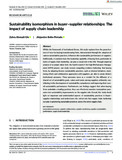Mostrar el registro sencillo del ítem
Sustainability isomorphism in buyer–supplier relationships: the impact of supply chain leadership
| dc.creator | Ahmadi Ghobadbezani, Zahra | es_ES |
| dc.creator | Bello Pintado, Alejandro | es_ES |
| dc.date.accessioned | 2024-03-22T15:31:42Z | |
| dc.date.available | 2024-03-22T15:31:42Z | |
| dc.date.issued | 2024 | |
| dc.identifier.citation | Ahmadi‐Gh, Z., & Bello‐Pintado, A. (2024). Sustainability isomorphism in buyer–supplier relationships: The impact of supply chain leadership. Business Strategy and the Environment, bse.3668. https://doi.org/10.1002/bse.3668 | en |
| dc.identifier.issn | 0964-4733 | |
| dc.identifier.uri | https://hdl.handle.net/2454/47764 | |
| dc.description.abstract | Within the framework of institutional theory, this study explores how the proactiveness of focal (or buying) manufacturing firms, demonstrated through the adoption of various sustainability practices, influences the sustainability performance of suppliers. Additionally, it examines how the leadership capability of buying firms, particularly in terms of supply chain leadership, can play a crucial role in this link. Through empirical analysis of a sample taken from the fourth round of the High-Performance Management (HPM) project, our study reveals compelling evidence indicating that buying firms, by adopting diverse sustainability practices, such as internal initiatives, monitoring efforts and collaborative approaches with suppliers, are able to create distinct institutional pressures. These pressures serve as a conduit for the diffusion of a shared set of sustainability goals, values and norms among suppliers, ultimately contributing to the development of sustainability competences and improving their overall sustainability performance. Furthermore, our findings suggest that when buying firms undertake a leading position, they can effectively translate isomorphism pressures into sustainability improvements on the supplier side. Overall, this study sheds light on important and understudied aspects of sustainability practices in buyer¿supplier relationships and underscores the critical role that supply chain leadership can play in promoting sustainable practices across the entire supply chain. | en |
| dc.description.sponsorship | This research was funded and conducted within the frameworks of the following projects: PID2020-115018RB-C31 and AEI/FEDER, UE research project financed by the Spanish Ministry of Science, Innovation and Universities (Ministerio de Ciencia, Innovación y Universidades) and the European Regional Development Fund; PID2019-105001GB-I00 (Ministerio de Ciencia e Innovación—Spain); and ECO2017-86305-C4-4-R (Ministerio de Asuntos Económicos y Transformación Digital, Gobierno de España). | es_ES |
| dc.format.mimetype | application/pdf | en |
| dc.language.iso | eng | en |
| dc.publisher | Wiley | en |
| dc.relation.ispartof | Business Strategy and the Environment 20204, bse.3668, 1-19 | en |
| dc.rights | © 2024 The Authors. This is an open access article under the terms of the Creative Commons Attribution-NonCommercial-NoDerivsLicense. | en |
| dc.rights.uri | http://creativecommons.org/licenses/by-nc-nd/4.0/ | |
| dc.subject | Isomorphism pressures | en |
| dc.subject | Supplier collaboration | en |
| dc.subject | Supplier monitoring | en |
| dc.subject | Supplier sustainability performance | en |
| dc.subject | Supply chain leadership | en |
| dc.title | Sustainability isomorphism in buyer–supplier relationships: the impact of supply chain leadership | en |
| dc.type | Artículo / Artikulua | es |
| dc.type | info:eu-repo/semantics/article | en |
| dc.date.updated | 2024-03-22T15:11:33Z | |
| dc.contributor.department | Institute for Advanced Research in Business and Economics - INARBE | en |
| dc.rights.accessRights | Acceso abierto / Sarbide irekia | es |
| dc.rights.accessRights | info:eu-repo/semantics/openAccess | en |
| dc.identifier.doi | 10.1002/bse.3668 | |
| dc.relation.projectID | info:eu-repo/grantAgreement/AEI/Plan Estatal de Investigación Científica y Técnica y de Innovación 2017-2020/PID2020-115018RB-C31/ES/ | en |
| dc.relation.projectID | info:eu-repo/grantAgreement/AEI/Plan Estatal de Investigación Científica y Técnica y de Innovación 2017-2020/PID2019-105001GB-I00/ES/ | en |
| dc.relation.projectID | info:eu-repo/grantAgreement/AEI/Plan Estatal de Investigación Científica y Técnica y de Innovación 2013-2016/ECO2017-86305-C4-4-R/ES/ | en |
| dc.relation.publisherversion | https://doi.org/10.1002/bse.3668 | |
| dc.type.version | Versión publicada / Argitaratu den bertsioa | es |
| dc.type.version | info:eu-repo/semantics/publishedVersion | en |



